
Related
Topics
Guests
- Moazzam Beggformer Guantanamo detainee who was imprisoned for three years without charge by the United States at Bagram airbase in Afghanistan and Guanatanmo Bay in Cuba.
In a Democracy Now! U.S. national broadcast exclusive, we hear former Guantanamo detainee Moazzam Begg in his own words. He was imprisoned for three years without charge by the United States at Bagram airbase in Afghanistan and Guanatanmo Bay in Cuba. We broadcast his first comments in this country since the publication of his book in Britain, “Enemy Combatant: A British Muslim’s Journey to Guantanamo and Back.” [includes rush transcript]
The Associated Press yesterday sued the Defense Department for the release of records identifying all past and current detainees at the US-run prison camp in Guantanamo Bay, Cuba. The AP’s suit was filed after the Pentagon failed to respond to a Freedom of Information Act lawsuit filed by the AP in January. Last month, the military was ordered to turn over uncensored copies of transcripts from hearings for detainees held at Guantanamo. The transcripts were released, however they were censored, and names and other key details were blacked out.
As international calls grow for the closure of the US-run prison camp at Guantanamo Bay, Cuba, today we bring you a voice rarely heard in the US media, that of a former Guantanamo prisoner. In a Democracy Now broadcast exclusive, today we hear Moazzam Begg in his own words.
Moazzam is a British citizen born and raised in Birmingham. The story of his ordeal begins in mid-2001 when he moved to Afghanistan with his wife and three young children to work as an aid worker in education and water projects. After September 11th and the subsequent U.S. bombing of Afghanistan, he relocated to Pakistan.
In February 2002, Moazzam was seized by the CIA in Islamabad. No reasons were given for his arrest. He was hooded, shackled and cuffed and flown to the U.S. detention facility at Kandahar, then to Bagram airbase where he was held for approximately a year before being transferred to Guantanamo Bay. The U.S. government labeled him an “enemy combatant.” He was never charged with a crime.
In all, Moazzam spent three years in prison, much of it in solitary confinement. He was subjected to over three hundred interrogations as well as death threats and torture. At Bagram, he witnessed the killing of two fellow detainees.
In January 2005, he was finally released from Guantanamo along with three other British citizens. He received no apology or compensation for his imprisonment.
Moazzam Begg has written a book about his experience that has just been published in the UK titled “Enemy Combatant: A British Muslim’s Journey to Guantanamo and Back.” It is the first book known to be published by a former Guantanamo Bay prisoner. The book is co-written by Victoria Brittain, a former associate foreign editor of the Guardian newspaper.
Last week, Victoria Brittain and Moazzam Begg held a public conversation and Q&A at the Institute of Contemporary Arts in central London. Democracy Now was there to cover the story. In this U.S. national broadcast exclusive, we bring you Moazzam’s first comments to air in this country since he wrote his book. At the event, I had the chance to ask Moazzam about the abuse he suffered while in prison.
- Moazzam Begg, former Guantanamo detainee and author of the book, “Enemy Combatant: A British Muslim’s Journey to Guantanamo and Back”
Transcript
AMY GOODMAN: Last week, Victoria Brittain and Moazzam Begg held a public conversation at the Institute of Contemporary Arts in Central London. Democracy Now! was there to cover the story. In this national broadcast exclusive, we bring you Moazzam’s first comments to air in this country since he wrote his book. After he and Victoria Brittain spoke, I had a chance to ask Moazzam about the abuse he suffered while he was in prison.
AMY GOODMAN: Moazzam, though you are almost synonymous with Guantanamo, when people think about it, in your book you describe being tortured at Bagram. And I was wondering if you could talk about what happened to you there, who tortured and interrogated you, and if you saw other people or knew of other people at Bagram who were killed or abused.
MOAZZAM BEGG: Yeah. I think it’s important also to note that when we are talking about Guantanamo Bay, in a sense, or in fact, it’s not as bad as Bagram at all. People know about Guantanamo Bay, because it’s in the news every day. You hear about it. You think it’s this terrible place, and it is, because of the absence of the law. But what’s worst than Guantanamo Bay are places like these black holes of detention, where you don’t know what’s going on, where there is no access to media, where the media doesn’t know what’s going on, and neither does anybody else, including the relatives and so forth. There is no communication. And it is a place that’s — it’s a military base, but the C.I.A. has complete and utter control of what takes place there. And no wonder in places like Bagram people are killed, and no wonder in Guantanamo Bay we haven’t heard of any deaths yet, because in places like Bagram, they can try and justify themselves by the proximity, as they call it, towards the war zone.
While I was held in Bagram, it was probably one of the hardest periods of the whole of the incarceration. One particular month in May, I was subjected to some extremely harsh interrogation techniques, which included being — or having my hands tied behind my back to my legs like an animal, as they call in America “hogtied,” with a hood placed over my head so I was in a suffocating position, kicked and beaten and sworn at and spat at, left to rot in this position for hours and hours on end and taken again into interrogation, and this lasted over a period of over a month.
That wasn’t the worst of it, of course. The worst of it, for me, was the psychological part, because all of this time I had no communication with my family at all. I didn’t know what happened to my wife or my children. For all I knew, they could have done terrible things to them. And that was the biggest fear.
And I met the International Committee of the Red Cross, and they allowed me to write letters, but, of course, all of these letters had to be passed through the U.S. military censorship, and they must have read all of the letters, and in them I expressed my deep anguish about the state of asking where my wife was to my parents. In one of the interrogations, I remember quite clearly, they had this — I heard the sounds of a woman screaming. And at the back of my mind, I thought, no, it can’t be what I truly think it is. And as the screaming got worse and worse and the shouting to this woman got worse, my heart rate went up, and I started imagining the unimaginable. And certainly they were playing on this. It was, I believe, to this day it probably written on my file: if you want to get to this guy, do it through his family. And so, that was definitely one of the hardest parts. Many detainees, even, in fact, afterwards, when I was removed from that isolation unit, said that, you know, we were praying to God that it’s not your wife. Well, thankfully, it wasn’t.
And the worst situation, I think, that I saw there was the deaths of the detainees. I mean, you can see — you can deal with your own abuse to some degree. What you can’t do is to see somebody else’s and then sit by and let it happen, and yet I was in such a impotent position that I saw a person who had been chained with his hands above his head like this, which is what they’d often do, which would often happen to me if I was just talking to the person next door to me, which was deemed punishable. This person was left suspended like this for hours, and eventually guards came and they beat him, dragged him upstairs, and we never saw or heard of him again.
A year-and-a-half later, internal investigators from the military came and asked me if I would look at a picture. They showed me a picture, and it was a man’s body, and they said that he had been killed, could I describe any of the details that I had saw in Bagram at that time, and I described to them what I saw. And then they brought photographs of the people that they said were responsible — could be responsible from the military units, the M.P.s, and I pointed out to the people who I believed had done it. And then, ironically, this was a time when I was in solitary confinement, also worried about facing a possible military commission by President Bush’s order, they said, “Would you be ready to stand up as a witness in a trial against these perpetrators?” That was so ironic.
AMY GOODMAN: Who did it to you?
MOAZZAM BEGG: Oh, the interrogators at the time? Yes, it was a whole group of them. There were C.I.A., F.B.I., and Military Intelligence. Those were at least the three groups that were there during that interrogation.
AMY GOODMAN: Moazzam, you talked about one of the men who was killed at Bagram, and you described the guard at Guantanamo who talked about killing another. How did he kill that person?
MOAZZAM BEGG: What had happened, I think the detainee’s number was 284, as I recall. This was said to be an escape attempt at the backs of the cells in Guantanamo — in Bagram. They were all common [inaudible]. There was about seven or eight people in each cell. At the back of the cell was this barrel that they had cut in half, which was, you know, the toilet. That was surrounded by some barbed wire. He apparently had pushed the barbed wire through, pushed the barrel and tried to escape. The guards caught him, jumped on him and, in essence, threw Thai boxing-style strikes at him, as this guy told me. And I saw them dragging his body across the cell where I was held, in cell 6, into the medical room, right in front where we were. At that point, I wasn’t sure whether he was dead, but he looked completely battered and bruised, and all the dust that was on him. A while after that, after all the medics and the officers were running around this area, his body was carried out on a stretcher with the sheet covering his head.
AMY GOODMAN: And the sexual abuse at Guantanamo and at Bagram?
MOAZZAM BEGG: Umm…
VICTORIA BRITTAIN: I don’t think you need to go into that.
MOAZZAM BEGG: I would rather just not answer that here.
VICTORIA BRITTAIN: I think we’ll leave that.
AMY GOODMAN: Moazzam Begg, speaking last week in London at the Institute of Contemporary Art, just after the British release of his book, Enemy Combatant. It’s coming to this country in the fall. These are his first national broadcast comments in this country. Imprisoned at Bagram Air Base, and then Guantanamo for over three years. When we come back we talk to his co-writer of the book, Victoria Brittain, the former Associate Editor of the Guardian, and we will also speak with his attorney, Gareth Peirce.

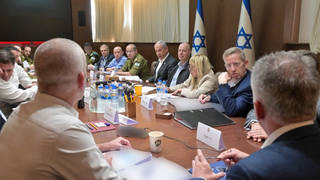

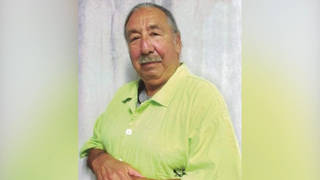
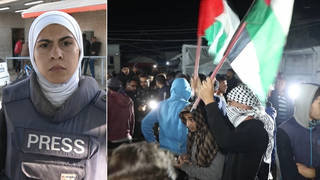





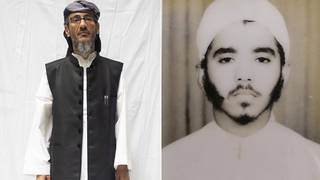
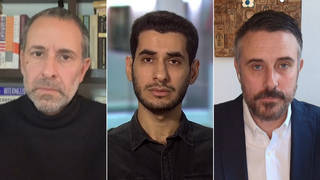
Media Options